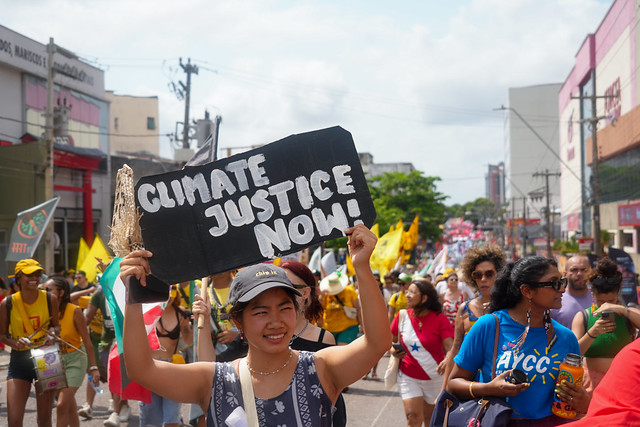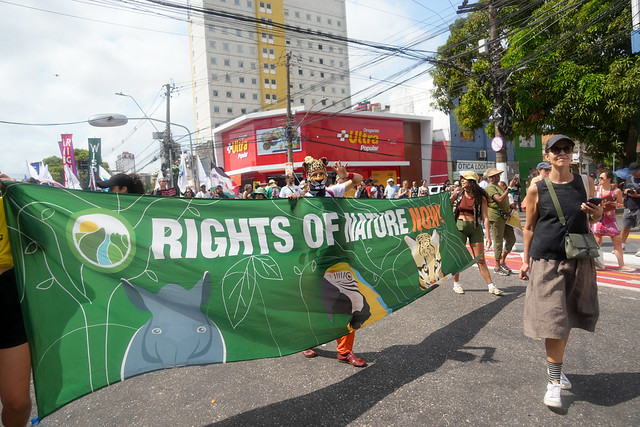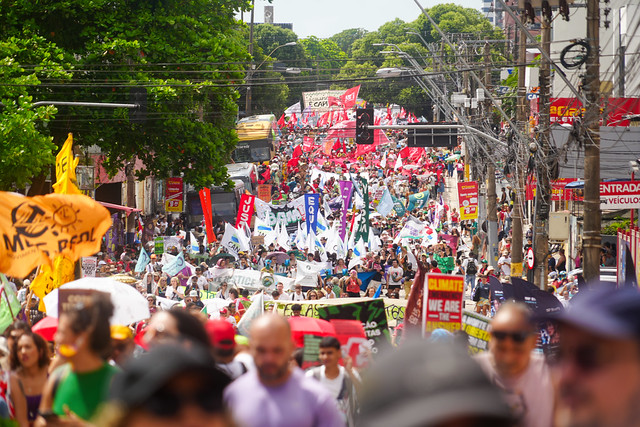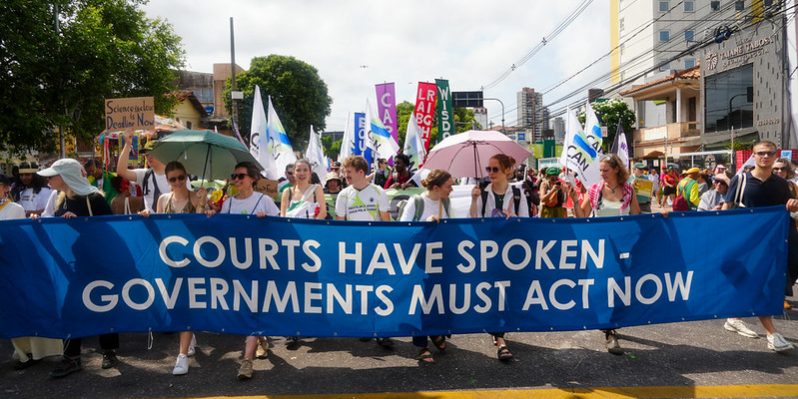At the COP30 climate talks in Belém, Brazil, representatives from the Global South staged a powerful and deeply symbolic act on Saturday. They organized a dramatic “Historic Funeral for Fossil Fuels,” marking a significant moment on the global stage.
The emotional ceremony, attended by over 70,000 people including Indigenous leaders, artists, and climate activists, served as a direct and urgent call to global leaders. It urged them to end the era of coal, oil, and gas and transition immediately to renewable energy.
The performance featured a gigantic, continent-representing coal, oil, and gas coffin that was carried through the streets. This act sent a resounding message from the communities most vulnerable to the climate crisis: the Global South is leading the charge.
Speaking to Pacific journalists in a virtual briefing from COP30 in Belém, Brazil, WWF-Pacific Senior Policy and Government Affairs Manager Alfred Ralifo says current global climate finance systems remain slow, complex, and continue to fail the people most at risk.
Ralifo stressed that funding is still not reaching communities or small island developing states quickly enough to respond to the escalating climate and biodiversity crises.
He highlighted a growing regional move toward locally managed trust funds, a mechanism that allows communities to receive direct donor financing while also strengthening local governance structures.
“This approach gives communities greater control over their own development. Donors can channel support directly, and communities can decide how best to use the funds,” he said.
Ralifo also pointed to the Pacific Resilience Facility (PRF) — a Pacific-owned and Pacific-led financing mechanism endorsed by regional leaders — as a major breakthrough in efforts to improve access to climate finance.
“The PRF is about Pacific self-determination. It will allow the region to channel funds more efficiently across countries and right down to the community level,” he added.
UN Climate Change Executive Secretary Simon Stiell has urged world leaders to deliver climate finance that is “fast, fair, and predictable,” telling ministers at COP30 that without trust and resources, global climate action will stall.

Speaking at the High-Level Ministerial Dialogue on Climate Finance on Saturday 15 November, Stiell said climate finance remains the “lifeblood of climate action,” turning national plans into real progress on the ground.
He said the dialogue is far more than a procedural exercise, stressing that developing countries – especially small island states – need clarity and assurance about the support available to implement their climate and adaptation plans.
“Without trust, implementation slows, ambition falters, and progress becomes much harder,” Stiell told ministers.
Stiell acknowledged that public and private climate finance flows have grown since the Paris Agreement, helping drive investments in clean energy, resilience and just transitions across many regions.
But he warned that finance remains insufficient, unreliable, and unevenly distributed.
“The adaptation finance gap remains far too wide,” he said, noting that many vulnerable countries face rising debt burdens and still struggle to access funds already pledged to them.
Stiell reminded developed countries that they were expected to double their collective adaptation finance by 2025. One clear pathway, he said, is to triple outflows from UNFCCC climate funds by 2030, including the Adaptation Fund, the Least Developed Countries Fund, and the Special Climate Fund.
“These are not abstract numbers,” he said. “They determine whether small island states can protect their coastlines, whether least developed countries can adapt their agriculture, and whether emerging economies can transition without deepening inequality.”
Stiell called for stronger public finance through grants, concessional loans, and non-debt-creating instruments. He also urged countries to simplify access procedures so money reaches vulnerable communities faster.
Addressing systemic barriers such as high debt and limited fiscal space is essential, he added, along with expanding blended finance, risk-sharing mechanisms, guarantees, equity investments, and debt-for-climate swaps to unlock private capital.
“Climate finance is not charity – it’s smart economics,” Stiell said, emphasising that climate action backed by sustainable finance is “the growth story of the 21st century.”
He urged ministers to deliver clearer, more actionable reporting under Article 9.5 to give developing countries real visibility on future funding and strengthen trust in the process.
“At COP30, the world is looking for proof that climate cooperation delivers,” Stiell said.
“When finance flows, ambition grows. And when ambition grows, implementation flows.” he adds.

He said countries must honour the commitments made in Paris a decade ago and show—through predictable, transparent climate finance—that they are serious about delivering a resilient and prosperous future for all.
Pacific leaders have formally endorsed the creation of the Pacific Resilience Facility (PRF), marking a major milestone for the region’s climate and disaster resilience efforts.
The decision was sealed during the 54th Pacific Islands Forum Leaders Meeting held in Honiara in September, where leaders approved the PRF as the region’s first dedicated financing facility aimed at strengthening resilience and unlocking climate funding.
Forum Chair and Solomon Islands Prime Minister Hon. Jeremiah Manele hailed the establishment of the PRF as a transformative step, describing it as a “game-changer” that reflects the region’s resolve to break long-standing barriers to accessing international climate finance.
“This is ours. This is the Pacific’s response — by the Pacific, for the Pacific — to the structural barriers we continue to face in accessing global climate financing, which remains too slow, too little, too complex and unpredictable,” Prime Minister Manele said.
The PRF will begin with an initial capital target of US$500 million, with plans to scale the fund to US$1.5 billion as momentum grows across development partners and member states.
Representing Solomon Islands at the Pacific Pavilion last week, Director of the Climate Change Division, Mr Thaddeus Siota, delivered a statement on behalf of the Minister for Environment, Climate Change, Disaster Management and Meteorology (MECDM), Hon. Polycarp Paea.
In his remarks, Mr Siota reinforced the Pacific’s collective demand for climate finance arrangements that are “owned, managed, and led by the Pacific.”
He pointed to the Pacific Resilience Facility (PRF) as a tangible, homegrown solution designed to empower communities and reduce reliance on traditional donor-driven systems.
“The PRF is our answer to the challenge of climate finance. It represents a shift from dependency to ownership, from charity to investment,” he said.
“This is how we ensure that climate finance truly works for us in the Pacific, without compromising our governance and accountability.”

Headquartered in Palau, the PRF is intended to channel funds directly to local governments and community groups to strengthen resilience, safeguard ecosystems, and support climate adaptation initiatives. To date, the facility has secured US$167 million in commitments and is working toward a capitalisation target of US$500 million by 2026.
Mr Siota noted that the first call for project proposals is anticipated in late 2025 or early 2026, followed by a three-year pilot phase.
“The Pacific Resilience Facility is not just a fund — it is a long-term commitment to our survival, our sovereignty, and our shared future,” he said.
As the COP30 negotiations continue, the Global South has firmly planted the issue of phasing out fossil fuels at the forefront, challenging world leaders—including those in the Pacific—to take concrete, binding action to ensure a future of peace and prosperity, especially for the communities already battling the worst effects of climate change.
By ULUTAH GINA
Solomon Star Gizo
“This story was produced as part of the 2025 Virtual Climate Change Media Partnership, a journalism fellowship organized by Internews’ Earth Journalism Network and the Stanley Center for Peace and Security’’.









